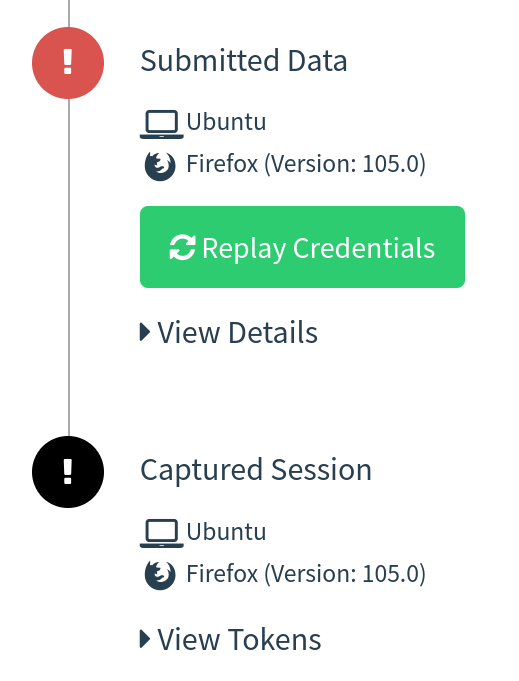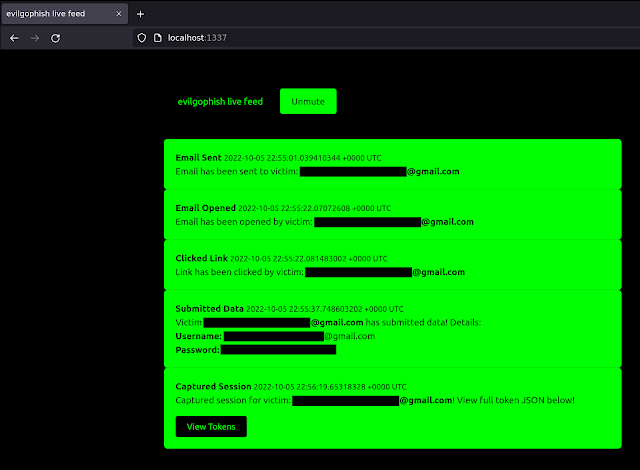[]()
Combination of [evilginx2]( “evilginx2” ) and [GoPhish]( “GoPhish” ).
## Credits
Before I begin, I would like to say that I am in no way bashing [Kuba Gretzky]( “Kuba Gretzky” ) and his work. I thank him personally for releasing [evilginx2]( “evilginx2” ) to the public. In fact, without his work this work would not exist. I must also thank [Jordan Wright]( “Jordan Wright” ) for developing/maintaining the incredible [GoPhish]( “GoPhish” ) toolkit.
## Prerequisites
You should have a fundamental understanding of how to use `GoPhish`, `evilginx2`, and `Apache2`.
## Disclaimer
I shall not be responsible or liable for any misuse or illegitimate use of this software. This software is only to be used in authorized [penetration testing]( “penetration testing” ) or red team engagements where the operator(s) has(ve) been given explicit written permission to carry out social engineering.
## Why?
As a penetration tester or red teamer, you may have heard of `evilginx2` as a proxy [man-in-the-middle]( “man-in-the-middle” ) framework capable of bypassing `two-factor/multi-factor authentication`. This is enticing to us to say the least, but when trying to use it for [social engineering]( “social engineering” ) engagements, there are some issues off the bat. I will highlight the two main problems that have been addressed with this project, although some other bugs have been fixed in this version which I will highlight later.
1. Lack of tracking – `evilginx2` does not provide unique tracking statistics per victim (e.g. opened email, clicked link, etc.), this is problematic for clients who want/need/pay for these statistics when signing up for a social engineering engagement.
2. Session overwriting with NAT and proxying – `evilginx2` bases a lot of logic off of remote IP address and will whitelist an IP for 10 minutes after the victim triggers a lure path. `evilginx2` will then skip creating a new session for the IP address if it triggers the lure path again (if still in the 10 minute window). This presents issues for us if our victims are behind a firewall all sharing the same public IP address, as the same session within `evilginx2` will continue to overwrite with multiple victim’s data, leading to missed and lost data. This also presents an issue for our proxy setup, since `localhost` is the only IP address requesting `evilginx2`.
## Background
In this setup, `GoPhish` is used to send emails and provide a dashboard for `evilginx2` campaign statistics, but it is not used for any landing pages. Your phishing links sent from `GoPhish` will point to an `evilginx2` lure path and `evilginx2` will be used for landing pages. This provides the ability to still bypass `2FA/MFA` with `evilginx2`, without losing those precious stats. `Apache2` is simply used as a proxy to the local `evilginx2` server and an additional hardening layer for your phishing infrastructure. Realtime campaign event notifications have been provided with a local websocket/http server I have developed and full usable `JSON` strings containing tokens/cookies from `evilginx2` are displayed directly in the `GoPhish` GUI (and feed):
[]( “evilginx2 + gophish (30)” )[]()
## Infrastructure Layout
* `evilginx2` will listen locally on port `8443`
* `GoPhish` will listen locally on port `8080` and `3333`
* `Apache2` will listen on port `443` externally and proxy to local `evilginx2` server
* Requests will be filtered at `Apache2` layer based on redirect rules and IP blacklist configuration
* Redirect functionality for unauthorized requests is still baked into `evilginx2` if a request hits the `evilginx2` server
## setup.sh
`setup.sh` has been provided to automate the needed configurations for you. Once this script is run and you’ve fed it the right values, you should be ready to get started. Below is the setup help (note that certificate setup is based on `letsencrypt` filenames):
Redirect rules have been included to keep unwanted visitors from visiting the phishing server as well as an IP blacklist. The blacklist contains IP addresses/blocks owned by ProofPoint, Microsoft, TrendMicro, etc. Redirect rules will redirect known _”bad”_ remote hostnames as well as User-Agent strings.
## replace_rid.sh
In case you ran `setup.sh` once and already replaced the default `RId` value throughout the project, `replace_rid.sh` was created to replace the `RId` value again.
Usage:
./replace_rid
– previous rid – the previous rid value that was replaced
– new rid – the new rid value to replace the previous
Example:
./replace_rid.sh user_id client_id
## Email Campaign Setup
Once `setup.sh` is run, the next steps are:
1. Start `GoPhish` and configure email template, email sending profile, and groups
2. Start `evilginx2` and configure phishlet and lure (must specify full path to `GoPhish` `sqlite3` database with `-g` flag)
3. Ensure `Apache2` server is started
4. Launch campaign from `GoPhish` and make the landing URL your lure path for `evilginx2` phishlet
5. **PROFIT**
## SMS Campaign Setup
An entire reworking of `GoPhish` was performed in order to provide `SMS` campaign support with `Twilio`. Your new `evilgophish` dashboard will look like below:
[]( “evilginx2 + gophish (31)” )[]()
Once you have run `setup.sh`, the next steps are:
1. Configure `SMS` message template. You will use `Text` only when creating a `SMS` message template, and you should not include a tracking link as it will appear in the `SMS` message. Leave `Envelope Sender` and `Subject` blank like below:
[]( “evilginx2 + gophish (32)” )[]()
2. Configure `SMS Sending Profile`. Enter your [phone number]( “phone number” ) from `Twilio`, `Account SID`, `Auth Token`, and delay in between messages into the `SMS Sending Profiles` page:
[]( “evilginx2 + gophish (34)” )[]()
3. Import groups. The `CSV` template values have been kept the same for compatibility, so keep the `CSV` column names the same and place your target phone numbers into the `Email` column. Note that `Twilio` accepts the following phone number formats, so they must be in one of these three:
[]( “evilginx2 + gophish (35)” )[]()
4. Start `evilginx2` and configure phishlet and lure (must specify full path to `GoPhish` `sqlite3` database with `-g` flag)
5. Ensure `Apache2` server is started
6. Launch campaign from `GoPhish` and make the landing URL your lure path for `evilginx2` phishlet
7. **PROFIT**
## Live Feed Setup
Realtime campaign event notifications are handled by a local websocket/http server and live feed app. To get setup:
1. Select `true` for `feed bool` when running `setup.sh`
2. `cd` into the `evilfeed` directory and start the app with `./evilfeed`
3. When starting `evilginx2`, supply the `-feed` flag to enable the feed. For example:
`./evilginx2 -feed -g /opt/evilgophish/gophish/gophish.db`
4. You can begin viewing the live feed at: `https://localhost:1337/`. The feed dashboard will look like below:
[]( “evilginx2 + gophish (36)” )[]()
**IMPORTANT NOTES**
* The live feed page hooks a websocket for events with `JavaScript` and you **DO NOT** need to refresh the page. If you refresh the page, you will **LOSE** all events up to that point.
## Phishlets Surprise
Included in the `evilginx2/phishlets` folder are three custom phishlets not included in [evilginx2]( “evilginx2” ).
1. `o3652` – modified/updated version of the original `o365` (stolen from [Optiv blog]( “Optiv blog” ))
2. `google` – updated from previous examples online (has issues, don’t use in live campaigns)
3. `knowbe4` – custom (don’t have access to an account for testing auth URL, works for single-factor campaigns, have not fully tested MFA)
## A Word About Phishlets
I feel like the world has been lacking some good phishlet examples lately. It would be great if this repository could be a central repository for the latest phishlets. Send me your phishlets at `some-email@example.com` for a chance to end up in `evilginx2/phishlets`. If you provide quality work, I will create a `Phishlets Hall of Fame` and you will be added to it.
## Changes To evilginx2
1. All IP [whitelisting]( “whitelisting” ) functionality removed, new proxy session is established for every new visitor that triggers a lure path regardless of remote IP
2. Fixed issue with phishlets not extracting credentials from `JSON` requests
3. Further _”bad”_ headers have been removed from responses
4. Added logic to check if `mime` type was failed to be retrieved from responses
5. All `X` headers relating to `evilginx2` have been removed throughout the code (to remove IOCs)
## Changes to GoPhish
1. All `X` headers relating to `GoPhish` have been removed throughout the code (to remove IOCs)
2. Custom 404 page functionality, place a `.html` file named `404.html` in `templates` folder (example has been provided)
3. Default `rid` string in phishing URLs is chosen by the operator in `setup.sh`
4. Transparency endpoint and messages completely removed
5. Added `SMS` Campaign Support
## Changelog
See the `CHANGELOG.md` file for changes made since the initial release.
## Issues and Support
I am taking the same stance as [Kuba Gretzky]( “Kuba Gretzky” ) and will not help creating phishlets. There are plenty of examples of working phishlets and for you to create your own, if you open an issue for a phishlet it will be closed. I will also not consider issues with your `Apache2`, `DNS`, or certificate setup as legitimate issues and they will be closed. However, if you encounter a legitimate failure/error with the program, I will take the issue seriously.
## Future Goals
* Additions to IP blacklist and redirect rules
* Add more phishlets
## Contributing
I would like to see this project improve and grow over time. If you have improvement ideas, new redirect rules, new IP addresses/blocks to blacklist, phishlets, or suggestions, please email me at: `some-email@example.com` or open a pull request.
**[Download Evilgophish]( “Download Evilgophish” )**Read More

